Hometown Delicacies
Published:
My hometown (Anqiu City) is known for its abundance of delicious food, many of which are closely tied to meat and alcohol—a reflection of the bold and hearty style of “drinking in big bowls and eating meat in big bites”. Speaking of meat and alcohol, the most famous delicacies come from Jingzhi, a small town under the jurisdiction of Anqiu City, Weifang, Shandong Province. Jingzhi is renowned for four specialty foods: Zhipan Roasted Pork, Jingzhi Stir-fried Pork, Jingzhi Three-layer Pancake, and Jingyangchun Liquor.
我家乡(山东潍坊安丘市)的美食特别多,而且很多都与酒肉有关,毕竟这是“大碗喝酒,大口吃肉”的豪爽风格的前提。说起酒肉来,最著名的便是景芝的美食。景芝镇是我的家乡市辖的一个小镇,有四大特色美食:芝泮烧肉、景芝小炒肉、景芝三页饼和景阳春酒。
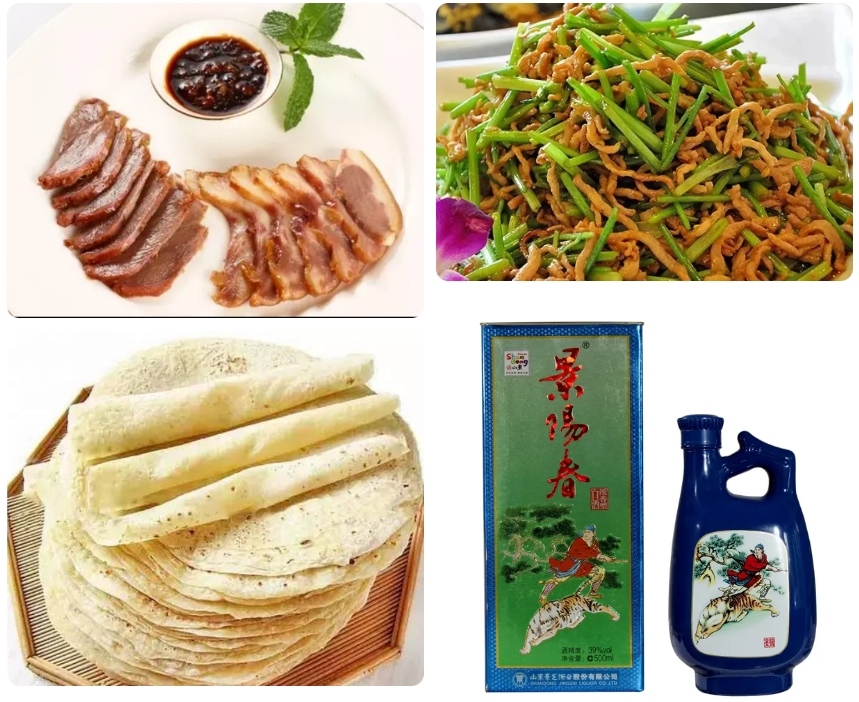
The images above (from top to bottom / left to right) respectively show: Zhipan Roasted Pork, Jingzhi Stir-fried Pork, Jingzhi Three-layer Pancake, and Jingyangchun Liquor.
上图分别为:芝泮烧肉、景芝小炒肉、景芝三页饼和景阳春酒。
Both Zhipan Roasted Pork and Jingzhi Stir-fried Pork are hearty pork dishes. The former is made by boiling large chunks of pork with the skin on, then smoking and roasting them with dozens of aromatic spices—imagine a barbecue-style braised pork belly, rich and flavorful. The latter is made by stir-frying finely sliced lean pork with vegetables like cilantro or garlic sprouts, seasoned with sweet bean sauce. It’s my personal favorite. The preparation of both dishes requires careful attention to ingredient ratios, heat control, and timing—otherwise, the authentic taste is easily lost.
芝泮烧肉和景芝小炒肉都是针对猪肉而做成的荤菜。前者是将大块带皮猪肉清洗煮熟后,添加数十种香料再烟熏火烤而成的,类似于烧烤版的红烧五花肉,非常香美。后者则是把香菜或蒜薹等菜品切成段,再将瘦猪肉切成差不多细的肉丝,加上甜面酱后一起炒成的,是我最喜欢的菜品。制作这两道菜的用料配比、火候、时间等都要十分考究,否则很容易做得不地道。
Jingzhi Three-layer Pancake is a type of wheat-based flatbread. It’s made by kneading refined flour with water until smooth, then rolling it into three paper-thin layers and combining them into one. When freshly made, the pancake is soft, aromatic, and ideal for wrapping a variety of foods—especially Zhipan Roasted Pork.
景芝三页饼则是一种面食,做法是将精面粉加水揉筋道后将其擀成三张薄如纸的面饼,再拼合而成。新做成的三页饼绵软鲜香,适合卷各种菜品,尤其是芝泮烧肉。
When these two dishes and the pancake are prepared just right and served alongside a bottle of Jingyangchun liquor, they form the ultimate local culinary combination. At mealtime, as the dishes come out of the kitchen, the whole family gathers around the table. The soft pancakes pair perfectly with the rich roast pork, the savory stir-fry balances the crisp aroma of the white liquor. In that moment, the day’s exhaustion is swept away, replaced by a sense of joy and satisfaction—like the carefree indulgence of an emperor’s feast.
如果这一种面食、两种菜品都做得恰当好处且齐备,再配上景阳春酒,就成了家乡人最爱的美食组合。一到饭点,美食出锅,全家人围而夹筷啖之,绵软三页饼配合浓郁烧肉,鲜香小炒配合甘冽白酒,真是令一家人其乐融融、心旷神怡,一日的劳苦全都扫净,只剩皇帝般的快活享受。
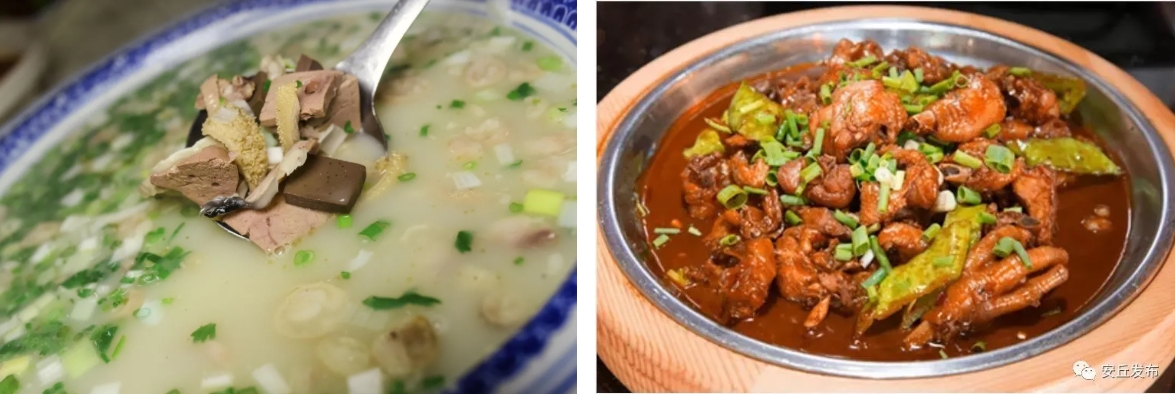
Linqu Whole Lamb and Zheshan Firewood Chicken.
临朐全羊和柘山木柴鸡。
Besides pork, people in my hometown are also skilled in cooking chicken and mutton, which brings us to two other local signature dishes: Linqu Whole Lamb and Zheshan Firewood Chicken.
除了猪肉以外,家乡人还擅长烹饪鸡和羊。这又引出两道当地名菜——临朐全羊和柘山木柴鸡。
Linqu Whole Lamb is made by boiling a freshly butchered mix of lamb meat, blood, and tendons with various seasonings. The remaining broth is left to cool and solidify. This gelatinous mixture is then re-boiled with the cooked lamb before serving. Premium whole lamb has a tender yet firm texture, a rich flavor without gaminess, and is pleasantly chewy. Naturally, the broth itself is incredibly flavorful and should not be missed.
临朐全羊的做法是把现杀的新鲜干净羊肉、羊血、羊筋等的混合物加佐料煮熟,将剩余的肉汤冷凝,再将凝固物兑水烧开,后加入做好的熟全羊焯一下即出锅。上好的全羊肉质细腻而紧凑,味道香而不膻,有弹性而又容易嚼。当然,汤的味道也是无比鲜美的,不容错过。
Zheshan Firewood Chicken is made by chopping up a freshly slaughtered old hen, which is then stir-fried over a wood-fired iron wok with ginger, scallions, garlic, star anise, and mugwort to bring out the aroma. Water, cooking wine, and other seasonings are then added, and the pot is covered and simmered until most of the liquid evaporates. The resulting chicken is deeply flavorful, perfectly tender, and the use of real firewood imparts a rustic, back-to-nature charm.
柘山木柴鸡则用现杀老鸡洗净切段,架土炉烧柴热铁锅,下葱姜蒜八角艾蒿等香料后爆炒出味,再将鸡、清水、适量白酒和调料下入,盖上盖子炖至锅内水大部分“靠净”(即蒸发走)即可。用此法做出的鸡肉十分入味,不紧不烂,木柴的使用也多了一份返璞归真的韵味儿。
These dishes reveal the locals’ deep appreciation for the taste and texture of meat. If luxurious dishes in big cities—like Japanese wagyu or salmon sashimi—are akin to meticulous gongbi (fine-line) paintings, then hometown delicacies such as Zhipan Roasted Pork, Linqu Whole Lamb, and Zheshan Firewood Chicken are like bold, expressive xieyi (freehand) brushwork—rough around the edges but emotionally intense, embodying a spirit of honesty, warmth, generosity, and unpretentiousness.
可见,家乡人对肉类的口感与品味要求非常之高。如果将大城市里奢侈的日本和牛肉和三文鱼刺身比作工笔画,那家乡的芝泮烧肉、临朐全羊和柘山木柴鸡便是写意画——以粗犷、大处着手为特征,行虽散而神极聚,处处铭刻着一种淳朴、豪迈、厚道、不拘小节的精神信仰。
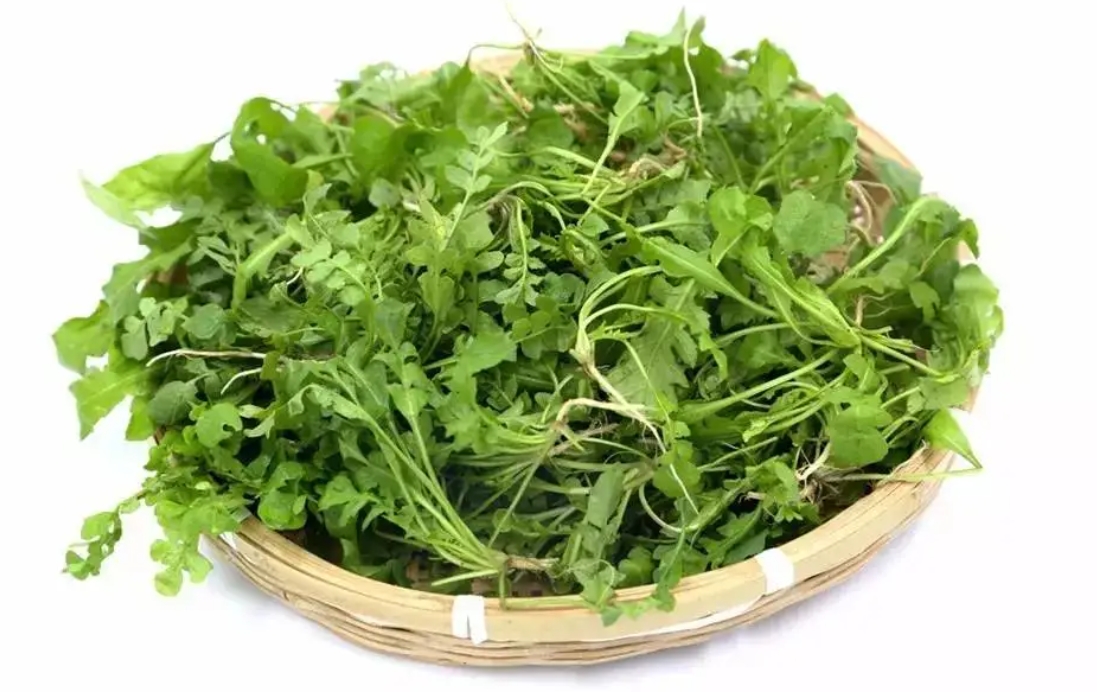
If you’re eating shepherd’s purse raw, be sure to include the long, slender roots—they’re what give it that extra sweetness and aroma. Beyond eating it raw, shepherd’s purse can be used in soups, steamed dishes, gently stir-fried, or made into dumpling fillings. With so many ways to prepare it, you’ll fall in love with it too.
如果生吃荠菜,一定要连着长长的根一起吃才更香甜。除了生吃,荠菜还可煮汤、清蒸、小火炒、包饺子,做法多多,总有一种为你所爱。
Of course, beyond meat, my hometown folks also cherish the humble mountain vegetables, especially raw shepherd’s purse with dipping sauce. Sometimes, after too many meals in university cafeterias or restaurants, I find myself craving that unique hometown flavor. I’d go online and pay a premium to buy a few kilos of fresh shepherd’s purse, wash it thoroughly, then enjoy it wrapped in pancakes with soybean paste, or cook it into a soup with egg using a self-heating hot pot. That alone is enough to satisfy several meals—and each bite tastes like home.
当然除了这种荤类佳肴,家乡人也同样钟爱素类的山珍,比如最朴素的生荠菜蘸酱。有时候在大学里吃食堂或者饭店吃惯了,就特别怀念家乡荠菜的味道。于是就设法从网上高价购来几斤,洗净以后蘸酱卷煎饼吃,或者用自热锅加鸡蛋煮汤喝。这能顶好几顿饭,还有滋有味的。
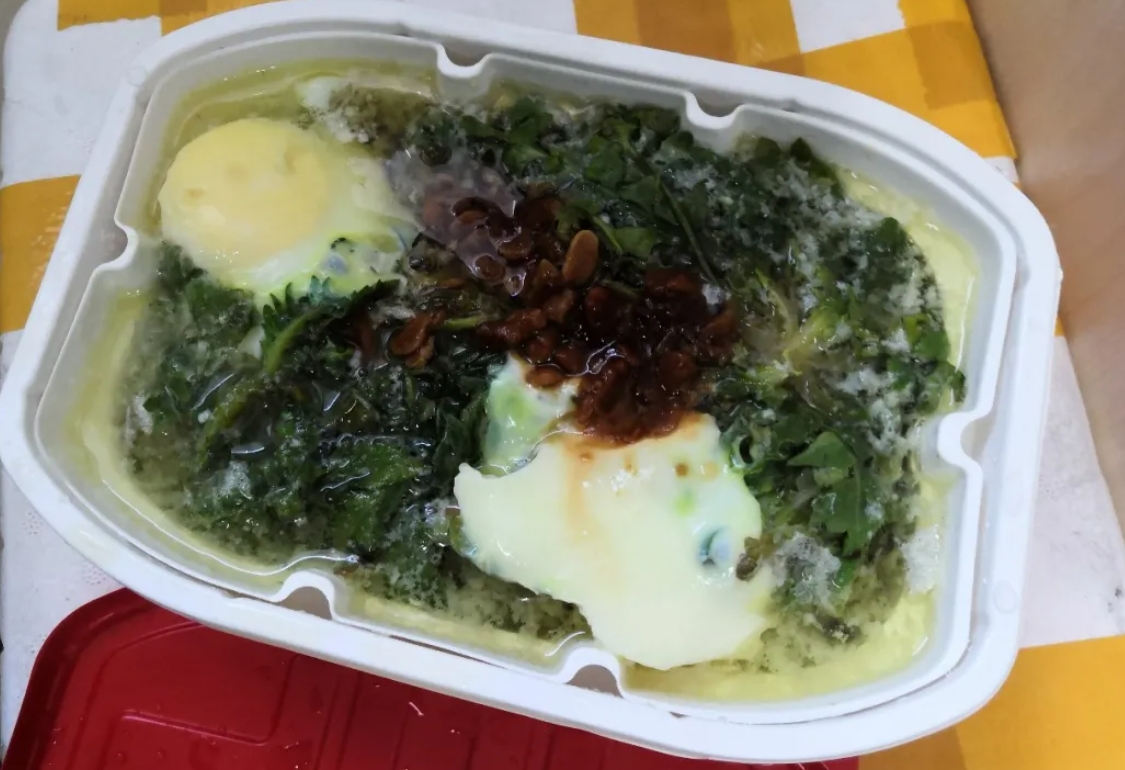
On May 10th, 2019, I made a bowl of shepherd’s purse and egg soup in my dorm room—absolutely delicious! Sure, it wasn’t the most photogenic dish, but who cares? Hometown food has never needed a fancy appearance to shine—its true strength lies in the rich, comforting flavors that speak for themselves.
2019年5月10日我在宿舍自制的荠菜蛋汤,很美味!虽然不太美观,但是谁介意呢!家乡菜从来都是用美味硬实力(而非华美的外表)代言的!
Another all-time favorite of mine is dumplings. I remember during a geology field trip in Donghai County, Jiangsu, I stumbled into a small, tucked-away dumpling shop for lunch. For just 15 yuan, I got 30 freshly boiled dumplings stuffed with Chinese chives and eggs—and the taste was simply incredible! That one bite immediately brought back memories of home. I’ve tried delicacies from all over the country, but nothing quite awakens my palate like a plate of hometown-style dumplings.
另外一个最钟爱的便是饺子。去年我在江苏东海县地质考察,中午感到饥饿,便随便在一家偏僻的小饺子馆花15元卖买了30个韭菜鸡蛋水饺,那味道简直叫一个香!我瞬间惦念到了家乡的味道。在外吃了那么多各地的山珍海味,都不如这一盘家乡味道的饺子最能调动起我的味蕾。
I’ve even eaten dumplings in Beijing that cost over 1 yuan apiece—despite the steep price, they tasted bland and uninspired. After that, I swore off these overpriced dumplings. It’s strange—some things, once they’re “elevated” into fine dining and stripped of their down-to-earth charm, seem to lose their original soul and vitality.
我也吃过北京那些价格高达一块多钱一个的水饺,尽管身价如此高,但吃起来真的索然无味。后来我也再也不吃北京的“天价”水饺了。这个也很奇怪,似乎有些事物所谓“晋升”到“大雅之堂”,脱掉了凡俗的“地气儿”后,似乎就荡然无存了某种初心和精气神儿。
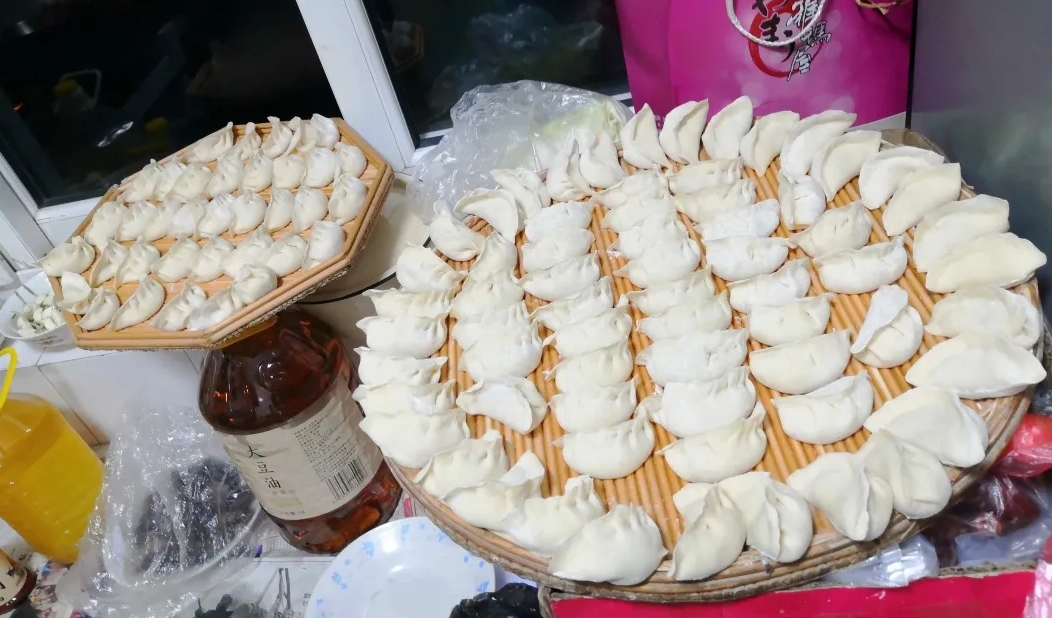
On January 24th, 2020, we made homemade pork and cabbage dumplings for our Lunar New Year’s Eve dinner—authentic hometown flavor!
2020年1月24日,我家包的年夜饭猪肉白菜馅水饺。正宗家乡味!
Beyond the variety of dishes, the hearty and generous spirit of Shandong people is also reflected in the portion sizes. A dish that costs just a dozen yuan is often served on a large plate, piled high with meat—you really get your money’s worth. In full-lamb restaurants or popular hotpot spots, meat is sold by the jin (500 grams), not by the gram. In contrast, I found Beijing’s portion sizes shockingly small—many dishes look plentiful but are only thinly layered on the plate. Even more surprising, some hotpot restaurants sell meat by the gram, which felt absolutely absurd to me.
除了美食的品种,山东人淳朴厚道的性格也在美食的体量上体现得淋漓尽致——餐馆里一盘十几块钱的菜,会用大盘子盛得满满当当,用荤的量也会让人感到非常“实在”。如果你去全羊店或者当地著名的火锅店,你会发现那里的肉都是论斤起卖。相比之下,我发现北京的菜份量竟然是如此之小——很多菜看似很多但实际上只是摆上了薄薄的一层;另外,很多火锅店里的肉竟然是论克卖的!这令我一度感到非常离谱。
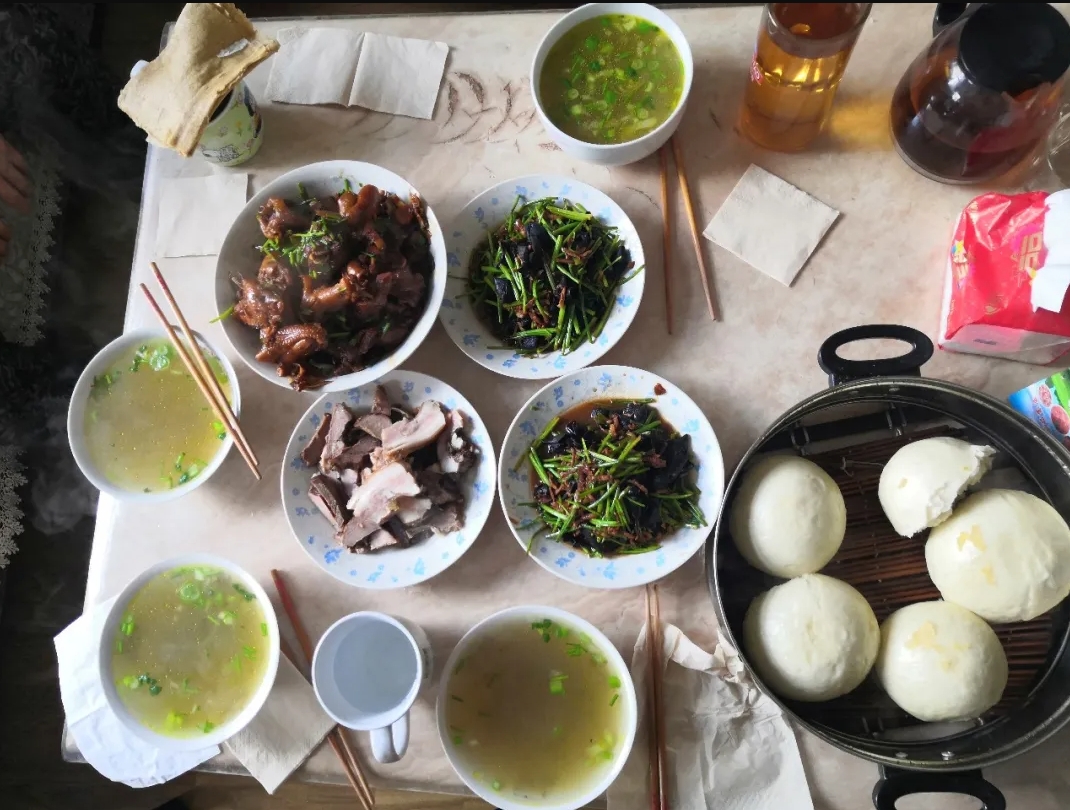
On January 22nd, 2020, here’s what our family had for lunch: Zheshan wood-fired chicken, Jingzhi-style stir-fried pork, Zhipan roasted pork, and our own hand-kneaded, incredibly chewy giant steamed buns!
2020年1月22日我家的午餐。图中可见:柘山木柴鸡、景芝小炒肉、芝泮烧肉和自家揉制的超级无敌筋道大饽饽!
Finally, the character of Shandong people is also evident in their dining etiquette. Above all, Shandong folks value being “real” (实在)—which means being unpretentious and treating guests like family. As hosts, they hope their guests feel completely at home, and the best way to gauge that is through signs of genuine ease. For example, if everyone’s grabbing food heartily and chatting freely—even bragging a little at the table—that’s considered a mark of sincerity. Most of the time, this warmth and openness helps guests quickly feel part of the group and builds strong emotional bonds. On the other hand, if a guest is too reserved or overly polite, it can come off as distant, even “inauthentic” (不实在), and may slightly dampen the connection.
最后,山东人的性格在餐桌礼仪上也有所体现。尤其是,山东人很讲究“实在”。所谓“实在”,就是“不客气”、“不见外”。作为东道主,山东人最希望客人能够有“宾至如归”的感受,而观察是否实现这一希冀的最佳方法就是看看是否“实在”。比如,大家围在一起吃饭的时候毫不谦让地“抢着吃”,并在饭桌上敞开心怀地高谈阔论、吹吹牛逼,都被看成“实在”的标志。在绝大多数情况下,这种行事的“实在”能够帮助宾客快速融入当地文化,并大大加强主宾之间的情感联结。相反,做客时太拘谨、客气,则容易被认为是“不实在”,主宾之间的情感交流也会因此而有所打折扣。
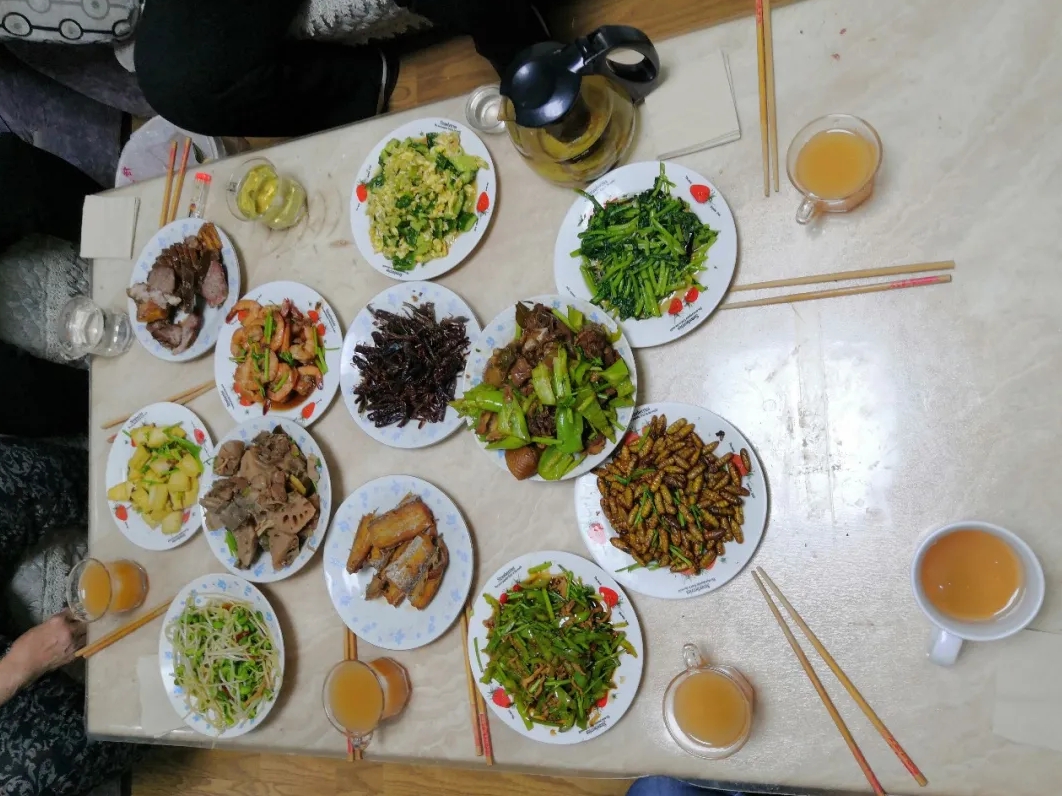
January 24th, 2020—our Lunar New Year’s Eve feast. Missing the taste of home!
2020年1月24日我家的年夜饭。怀念家乡味道!
